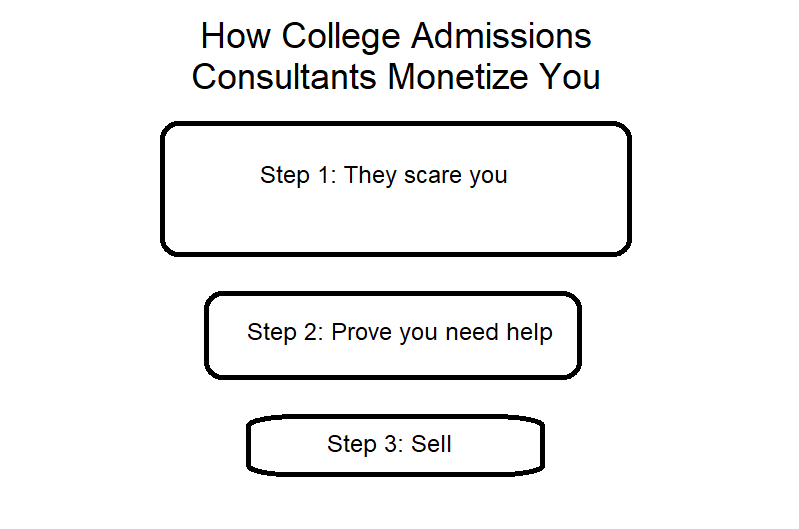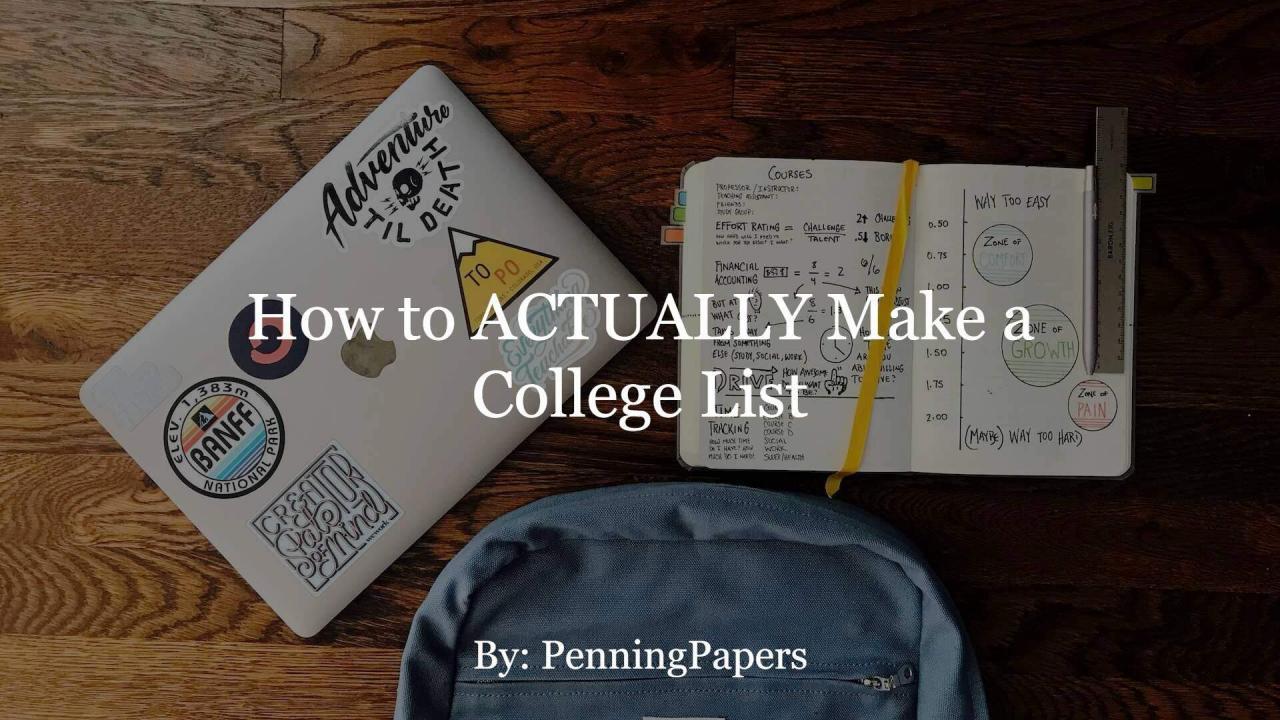So, you’re making a college list. You know that the moden college admissions process is more rigorous than ever. Thus, you’ll need to apply to more colleges whilst keeping more realistic expectations for colleges.
This can make things quite hard.
“What if I’m not applying to enough colleges.”
“Do I need more safeties?”
“Is this school a reach school? Or, should I try another one?”
“What are my chances of getting into my list of schools?”
“Which school should I ED to?”
These are all questions people ask during the admissions process, and what people end up with is a convoluted list of colleges that they don’t even know if they should apply for.
In this article, we’ll cover some crucial elements of making a college list; then, we’ll cover how to actually make one. Lastly, we’ll cover the four steps you should make when creating the college list to fit your needs.
- Something to Consider BEFORE You Start Making a College List.
- How to ACTUALLY Make a College List With a Counselor.
- How to Make a College List.
Professional College Application Help.
Contact us. We'll get to you within 24 hours.
Something to Consider BEFORE You Start Making a College List.

You may have come across guides online that show you how to make a college list. Or, you may have had your parents take you to an in-person counselor or tutor who would help you make one.
These are both fine. However, there’s a catch.
If you’re making a college list, it’s useful to get help from an advisor. But, it’s very common for people to use this as a way of upselling you on things you DON’T need.
Okay, so what do we mean by this?
It means that, while you’re confused and unsure of which colleges you should apply to, advisors and counselors may pressure you into applying to certain schools with the hopes of funneling you into making a purchase of their services.
This is called a sales funnel.
Here’s a visual representation.

Okay, is there anything wrong with buying college consulting services or packages when you’re looking for help with your college list? Well, no. There isn’t.
There’s nothing wrong with employing some extra help —given your counselor is qualified and capable! Nonetheless, it’s important that the advice and consulting your advisors are giving you are there to actually help you. They shouldn’t be exaggerating how screwed you are just to make an extra dollar. Instead, you should receive accurate advice that doesn’t make you more scared and insecure.
So… why do we mention college consulting sales tactics in an article about making a college list? Sounds kind of irrelevant, right?
Well, not really.
It’s often students who are in the early planning stages of the college admissions process (plus the late stages) who are most susceptible to anxiety and fear. This is also the stage when most parents are anxious and looking for quick methods of helping their kids get to Harvard. They want it fast and they want it now.
Perfect for college consulting firms.
This especially applies if you’re in an Asian household that values education a lot. We taught test prep and did consult in SoCal. We know.
If you or a parent are looking to get help from a college admissions counselor or advisor on customizing, be sure you’re working with someone who is going to listen to your desires and personal needs.
This brings us to the next point. How can you work with someone to really make a college list?
How to ACTUALLY Make a College List With a Counselor

For most students, it’s not easy to know which schools you want to apply to. It’s even harder to make a college list with all the fluctuations happening in the modern college admissions process. Some elements are being taken out of consideration, and others are being weighed more heavily.
This is why having a qualified college admissions advisor is recommended. They can help you debunk the common college app misconceptions and therefore give you a more informed perspective when choosing colleges.
Now, as we mentioned in the previous section, you don’t want a counselor who is just out there to squeeze every dollar out of you. Instead, you want someone who is going to help you give an accurate representation of what your college list should be based on your fit and needs.
When helping you make a college list, your counselor should be paying attention to all your intricate needs. They may know that applying to 12-15 schools is casting a wide net, and may be wise for students applying for T20 schools. However, they should understand that this is not always possible for students and therefore each student needs a custom list.
When your counselor makes a college list for you, they should be using their expertise to create a custom college list that suits you but also ensures you can earn the maximum acceptance rate with the best ROI.
How to Make a College List

Now, if you don’t have the luxury of a college admissions counselor or advisor, you can still follow these four steps to ensure you have the best list of schools that fits your needs.
Of course, if you don’t have an advisor, you can always work with us here at PenningPapers. Our college admissions counselors are capable of helping you make the right list to help maximize your admissions ROI.
Knowing What You Need.
The first step to making a college list is laying out all your needs. Get to know yourself better and list out the things you want in a college. You may also want to sort the factors you want in order of importance.
So, let’s say financial aid is more important to you than class size. Although you may very much want to attend a university with small class size, getting more financial aid is more important. So, the more financially generous university goes higher on your list.
Here is a list of common factors that contribute to a good school.
- Intended Major and Career Prospects: Most people apply to college because they have the intention of getting into a good career. Or, they’re looking to learn more about a certain subject that is meaningful to them. What is your intended major or career prospect? You most likely won’t know at this age. People seldom do. However, knowing what you want to major in and what you want to do in the future can help narrow down the schools you want a lot. If you do not know what you want to major in, you may also consider applying to schools that have versatile programs. That means schools that happen to have a wide net of great majors and programs that would prepare you, no matter if you need to switch your major. Examples of these include USC and UCLA.
- Social Scene and Culture: This is also crucial, perhaps more so than people would like to admit. The social scene and overall culture of a university are not something to be scoffed at. In fact, this is perhaps going to be the most memorable part of college. It’s not the work and it’s not the job waiting for you at the end of the tunnel (Although, those are still important.) What’s vital to a healthy college experience is how you go about the social scene and how you may make friends and have great experiences along the way. Look at the colleges you want to apply to and ask yourself what kind of social scene you need.
- Location and Region: Where your college is can make a big difference in whether you can apply. Some people don’t mind traveling across the country to go to college. Some would even enjoy a different environment from their hometown! Think about the kind of region you would be living in if you apply to a certain school, and how worth it that would be. If you were accepted into NYU, but you live in SoCal, would you mind trading the bright sun for the cold East Coast weather? Perhaps the culture in New York will be something exciting, new, and full of potential to make new friends. More often than not, travelling abroad for greener pastures is a great opportunity to be excited for!
- Athletics: This may be a deal breaker for some. But, some schools specialize in certain sports that fit your needs and some don’t have very strong athletics. Most students applying to college don’t have specialized athletics needs; but, if you do, you may have a much more narrow list of colleges you want to apply to. We would recommend having schools that don’t specialize in your particular athletics programs, though. After all, it’s not always guaranteed that you can land the school you want. So, you’ll need to have backup choices.
- Class and Population Size: This may make you more likely to apply to a certain school. But, small class sizes and smaller populations only really benefit some students. Some students prefer the social scene of a smaller class size and overall community. However, others may prefer larger ones. It may also have an effect on what your learning style is like. If you don’t do well in smaller class sizes because you don’t like having to contribute as much in classes, larger public schools may be the way to go and vice versa.
Cast a Wide Net of Colleges.
The next step to making a great college list is to cast a wide net.
This means making a list of anywhere between 12-30 schools that you would like to attend (with the entire UC system counting as 1 school.)
The reason you need to cast a wide net is because the college admissions process is more brutal now than ever before. The destabilization of the value of grades, the competitive nature of academics over time, and the rise of holistic admissions ensures that students will need to have more options to apply to if they want to get accepted anywhere.
This is a more conservative approach. It ensures you at least will have a decent handful of schools to choose to apply to when the admissions season ends. After all, you can narrow down your list later on.
Narrowing Down Your List.
Once you have a list of 12-30 schools, narrow down your options.
For students looking to get accepted into top schools, having around 12-15 schools in your college list is common. We recommend applying for the maximum or as close to the maximum of 20 schools provided by the common app plus public school options.
However, this is the most safe option to ensure you have the widest array of schools to choose from. You can narrow your list however much you want.
Consider the list of values we mentioned in the previous section before casting a wide net. What kind of values are most important to you? Sort these out in an organized manner to ensure you can narrow your list properly.
Sort Your Schools: Reach, Target, Safety.
Once you have your list of schools, you want to sort your schools by difficult of acceptance.
Sort them into three different sections.
- Reach: Schools that you know you have a slim chance of getting accepted into.
- Target: Schools that may reject you; but, their acceptance would not be outside the realm of possibility.
- Safety: Schools that are very likely to accept you given your background and academic performance.
You may have as many safety schools as you like. However, we often recommend students have at least 3 reach schools and 5 target schools. The same rules apply as before: the UC system counts as one school.
You will need to use your GPA, extracurriculars, essay quality, and other general background information to determine whether a school is your reach, target, or safety. Use the accepted class profile of the school you want to apply to as a metric. This can often be found on a school’s official website.
Of course, this process can be quite confusing. If your GPA is .2 higher than the average accepted Freshman GPA, does that mean it’s a safety? Is that a target? No one can really answer that unless they actually have all the details of your academic profile plus your extracurriculars and background information.
Thus, it’s up to you to decide schools belong in the reach, target, or safety category based on your unique qualifications and details.
If you’re looking for help building a college list, need someone to recommend you a list of colleges, or need someone to sort through which schools are reaches, targets, and safeties, we can certainly help. At PenningPapers, our expertise is careful, precise, and particular; this helps us cater our advice to your special needs. If you need help with any part of the college list building process, schedule a free phone consultation with us.

